StuviaNurse
Nursing Exams -Approved By stuvia Tutor
- 238
- 0
- 17
Community
- Followers
- Following
99 Reviews received
255 items
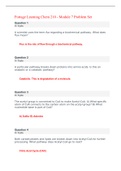
PORTAGE LEARNING CHEM 210 MODULE 7 PROBLEM SET
Portage Learning Chem 210 - Module 7 Problem Set A scientist uses the term flux regarding a biochemical pathway. What does flux mean? Flux is the rate of flow through a biochemical pathway. A particular pathway breaks down proteins into amino acids. Is this an anabolic or a catabolic pathway? Catabolic. This is degradation of a molecule. The acetyl group is connected to CoA to make Acetyl-CoA. A) What specific atom of CoA connects to the carbon atom on the...
- Exam (elaborations)
- • 10 pages •
Portage Learning Chem 210 - Module 7 Problem Set A scientist uses the term flux regarding a biochemical pathway. What does flux mean? Flux is the rate of flow through a biochemical pathway. A particular pathway breaks down proteins into amino acids. Is this an anabolic or a catabolic pathway? Catabolic. This is degradation of a molecule. The acetyl group is connected to CoA to make Acetyl-CoA. A) What specific atom of CoA connects to the carbon atom on the...
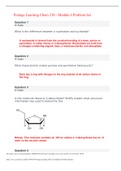
PORTAGE LEARNING CHEM 210 MODULE 6 PROBLEM SET
Portage Learning Chem 210 - Module 6 Problem Set What is the difference between a nucleoside and nucleotide? A nucleoside is formed from the covalent bonding of a base, purine or pyrimidine, to either ribose or 2-deoxyribose. Nucleotides are built from a nitrogen-containing organic base, a monosaccharide, and phosphate. What characteristic makes purines and pyrimidine heterocyclic? Each has a ring with nitrogen in the ring instead of all carbon atoms in the ring. ...
- Exam (elaborations)
- • 5 pages •
Portage Learning Chem 210 - Module 6 Problem Set What is the difference between a nucleoside and nucleotide? A nucleoside is formed from the covalent bonding of a base, purine or pyrimidine, to either ribose or 2-deoxyribose. Nucleotides are built from a nitrogen-containing organic base, a monosaccharide, and phosphate. What characteristic makes purines and pyrimidine heterocyclic? Each has a ring with nitrogen in the ring instead of all carbon atoms in the ring. ...
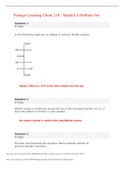
PORTAGE LEARNING CHEM 210_MODULE 4 PROBLEM SET
PORTAGE LEARNING CHEM 210_MODULE 4 PROBLEM SET Is the following molecule an aldose or ketose? Briefly explain. ketose. There is a C=O on the third carbon from the top. Which carbon in erythrose would tell you if the monosaccharide is D or L? Give the carbon’s number in your answer. On carbon number 3, which is the penultimate carbon. Glucose and mannose are epimers. Name another epimer of glucose besides mannose. Galactose. Is th...
- Exam (elaborations)
- • 7 pages •
PORTAGE LEARNING CHEM 210_MODULE 4 PROBLEM SET Is the following molecule an aldose or ketose? Briefly explain. ketose. There is a C=O on the third carbon from the top. Which carbon in erythrose would tell you if the monosaccharide is D or L? Give the carbon’s number in your answer. On carbon number 3, which is the penultimate carbon. Glucose and mannose are epimers. Name another epimer of glucose besides mannose. Galactose. Is th...
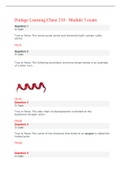
PORTAGE LEARNING CHEM 210_MODULE 3 EXAM
PORTAGE LEARNING CHEM 210_MODULE 3 EXAM True or False: The amino acids serine and threonine both contain sulfur atoms. FALSE True or False: The following secondary structure shown below is an example of a beta- turn. FALSE True or False. The side chain of phenylalanine is bonded to the backbone nitrogen atom. FALSE True or False: The name of the molecule that binds to an enzyme is called the holoenzyme. FALSE True or False: An inhibitor...
- Exam (elaborations)
- • 16 pages •
PORTAGE LEARNING CHEM 210_MODULE 3 EXAM True or False: The amino acids serine and threonine both contain sulfur atoms. FALSE True or False: The following secondary structure shown below is an example of a beta- turn. FALSE True or False. The side chain of phenylalanine is bonded to the backbone nitrogen atom. FALSE True or False: The name of the molecule that binds to an enzyme is called the holoenzyme. FALSE True or False: An inhibitor...
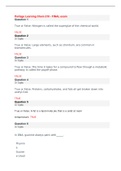
PORTAGE LEARNING CHEM 210_FINAL EXAM
PORTAGE LEARNING CHEM 210_FINAL EXAM True or False: Nitrogen is called the superglue of the chemical world. FALSE True or False: Large elements, such as strontium, are common in biomolecules. FALSE True or False: The time it takes for a compound to flow through a metabolic pathway is called the payoff phase. FALSE True or False: Proteins, carbohydrates, and fats all get broken down into acetyl-CoA. TRUE True or False: A fat is a lipid molecule that is a solid at room t...
- Exam (elaborations)
- • 18 pages •
PORTAGE LEARNING CHEM 210_FINAL EXAM True or False: Nitrogen is called the superglue of the chemical world. FALSE True or False: Large elements, such as strontium, are common in biomolecules. FALSE True or False: The time it takes for a compound to flow through a metabolic pathway is called the payoff phase. FALSE True or False: Proteins, carbohydrates, and fats all get broken down into acetyl-CoA. TRUE True or False: A fat is a lipid molecule that is a solid at room t...
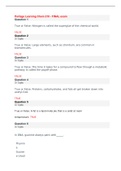
PORTAGE LEARNING CHEM 210- FINAL exam
PORTAGE LEARNING CHEM 210- FINAL exam True or False: Nitrogen is called the superglue of the chemical world. FALSE True or False: Large elements, such as strontium, are common in biomolecules. FALSE True or False: The time it takes for a compound to flow through a metabolic pathway is called the payoff phase. FALSE True or False: Proteins, carbohydrates, and fats all get broken down into acetyl-CoA. TRUE True or False: A fat is a lipid molecule that is a solid at room ...
- Exam (elaborations)
- • 18 pages •
PORTAGE LEARNING CHEM 210- FINAL exam True or False: Nitrogen is called the superglue of the chemical world. FALSE True or False: Large elements, such as strontium, are common in biomolecules. FALSE True or False: The time it takes for a compound to flow through a metabolic pathway is called the payoff phase. FALSE True or False: Proteins, carbohydrates, and fats all get broken down into acetyl-CoA. TRUE True or False: A fat is a lipid molecule that is a solid at room ...
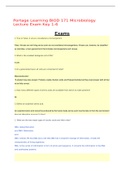
PORTAGE LEARNING BIOD 171 Microbiology Lecture Exam Key 1-6
Portage Learning BIOD 171 Microbiology Lecture Exam Key 1-6 Exams 1. What are the two major types of nucleic acids and their roles? DNA- deoxyribonucleic acid RNA- Ribonucleic acid DNA- Cellular life has DNA and a role that DNA has is long-term storage of information, it holds the characteristics of living organisms. RNA- Is the carrier of information in form of amino acid sequence. It converts the information in the DNA and synthesizes proteins Tru...
- Exam (elaborations)
- • 28 pages •
Portage Learning BIOD 171 Microbiology Lecture Exam Key 1-6 Exams 1. What are the two major types of nucleic acids and their roles? DNA- deoxyribonucleic acid RNA- Ribonucleic acid DNA- Cellular life has DNA and a role that DNA has is long-term storage of information, it holds the characteristics of living organisms. RNA- Is the carrier of information in form of amino acid sequence. It converts the information in the DNA and synthesizes proteins Tru...
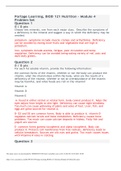
PORTAGE LEARNING BIOD 121 Nutrition – Module 4 Problem Set
Portage Learning, BIOD 121 Nutrition – Module 4 Problem Set Question 1 Choose two minerals, one from each major class. Describe the symptoms of a deficiency in the mineral and suggest a way in which the deficiency may be avoided. potassium- symptoms include muscle cramps and arrhythmias. Deficiency can be avoided by eating more fruits and vegetables that are high in potassium. iron- symptoms include anemia, fatigue, poor circulation and temp regulation. Deficiency can be avoided...
- Exam (elaborations)
- • 4 pages •
Portage Learning, BIOD 121 Nutrition – Module 4 Problem Set Question 1 Choose two minerals, one from each major class. Describe the symptoms of a deficiency in the mineral and suggest a way in which the deficiency may be avoided. potassium- symptoms include muscle cramps and arrhythmias. Deficiency can be avoided by eating more fruits and vegetables that are high in potassium. iron- symptoms include anemia, fatigue, poor circulation and temp regulation. Deficiency can be avoided...
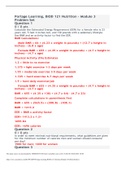
PORTAGE LEARNING BIOD 121 Nutrition – Module 3 Problem Set
Portage Learning, BIOD 121 Nutrition – Module 3 Problem Set Question 1 Calculate the Estimated Energy Requirement (EER) for a female who is 23 years old, 5 feet 4 inches tall, and 130 pounds with a sedentary lifestyle. Use BMR and an activity factor to find the EER. BMR Calculations: Male BMR = 66 + (6.23 x weight in pounds) + (12.7 x height in inches) - (6.8 x age) Female BMR = 655 + (4.35 x weight in pounds) + (4.7 x height in inches) - (4.7 x age) Physical Activity (PA) Es...
- Exam (elaborations)
- • 5 pages •
Portage Learning, BIOD 121 Nutrition – Module 3 Problem Set Question 1 Calculate the Estimated Energy Requirement (EER) for a female who is 23 years old, 5 feet 4 inches tall, and 130 pounds with a sedentary lifestyle. Use BMR and an activity factor to find the EER. BMR Calculations: Male BMR = 66 + (6.23 x weight in pounds) + (12.7 x height in inches) - (6.8 x age) Female BMR = 655 + (4.35 x weight in pounds) + (4.7 x height in inches) - (4.7 x age) Physical Activity (PA) Es...
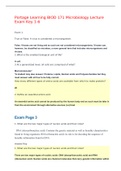
PORTAGE LEARNING BIOD 171 Microbiology Lecture Exam Key 1-6
Portage Learning BIOD 171 Microbiology Lecture Exam Key 1-6 Exam 1. True or False: A virus is considered a microorganism. False. Viruses are not living and as such are not considered microorganisms. Viruses can, however, be classified as microbes, a more general term that includes microorganisms and viruses. 2. What is the smallest biological unit of life? A cell. 3. At a generalized level, all cells are comprised of what? Macromolecules* *A student may also answer: Proteins,...
- Exam (elaborations)
- • 34 pages •
Portage Learning BIOD 171 Microbiology Lecture Exam Key 1-6 Exam 1. True or False: A virus is considered a microorganism. False. Viruses are not living and as such are not considered microorganisms. Viruses can, however, be classified as microbes, a more general term that includes microorganisms and viruses. 2. What is the smallest biological unit of life? A cell. 3. At a generalized level, all cells are comprised of what? Macromolecules* *A student may also answer: Proteins,...

ATI TEAS 7 QUESTION BANK(QUESTIONS&ANSWERS)2023 LATEST UPDATE(SCORED OVERALL OF 90% WITH THIS QUESTION BANK)
ATI TEAS 7 QUESTION BANK(QUESTIONS&ANSWERS)2023 LATEST UPDATE(SCORED OVERALL OF 90% WITH THIS QUESTION BANK)
NR 509 WEEK 7 QUIZ - QUESTIONS AND ANSWERS
FORTIS COLLEGE -NUR206 UNIT EXAM 3 RN PEDIATRICS (REAL EXAM) QUESTIONS&ANSWERS
FORTIS COLLEGE -NUR206 UNIT EXAM 3 RN PEDIATRICS (REAL EXAM) QUESTIONS&ANSWERS